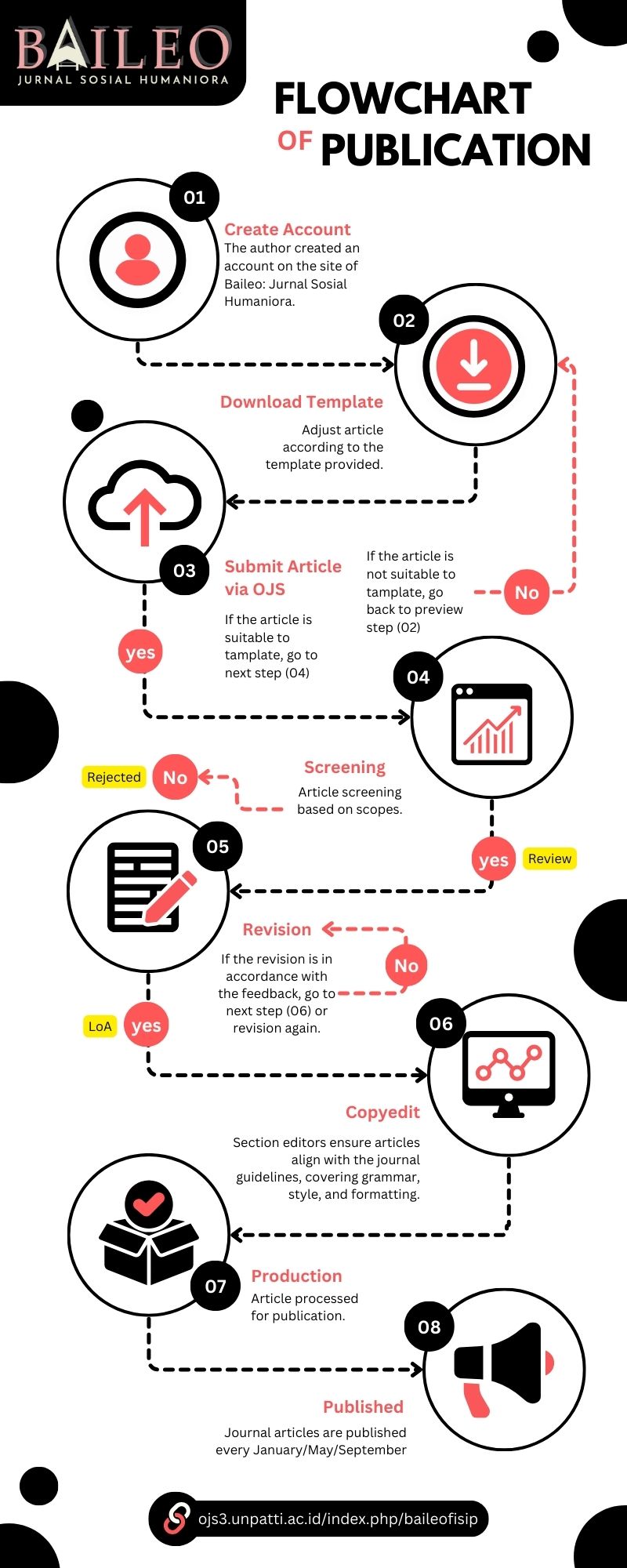| ..: MAIN MENU :.. |
| Register |
| Login |
| Reviewer |
| Focus and Scope |
| Editorial Team |
| Indexing |
| Contact |
Review Process
The review process for "Baileo: Jurnal Sosial Humaniora" involves crucial steps to ensure that submitted articles meet the quality standards set by the journal. The following is the review process flow for Baileo: Jurnal Sosial Humaniora:
Step 1: Article Submission
Authors submit their articles through the online platform Baileo: Jurnal Sosial Humaniora at https://ojs3.unpatti.ac.id/index.php/baileofisip/about/submissions . The articles must adhere to the journal's specified article format/template and writing style guidelines.
Step 2: Pre-Review Screening
After the article is received, the journal editor conducts a pre-review screening (desk review) to ensure that the article meets basic requirements, such as correct writing format, alignment with the journal's scope, plagiarism check using turnitin.com, and adherence to research ethics.
Step 3: Initial Assessment
The journal editor assesses the article to determine if the research has sufficient quality and relevance to proceed to the peer review process. If the article does not meet minimum standards, the author is notified of the rejection.
The article will be reviewed based on the following criteria:
- Contribution to advancing knowledge of Social and Humanities
- Quality of critical engagement with relevant literature (literature review, novelty, and discussion)
- Clarity of research and/or development goals
- Clarity and justification of appropriate methodology
- Quality of empirical data, analysis, presentation, and interpretation of results
- Inclusion of appropriate implications for further research, theory, practice, and/or policy.
- Quality of writing (including structure, writing style, clarity of expression)
Step 4: Peer Review Process
Articles that pass the initial assessment proceed to the peer review process. Typically, articles are reviewed by two or more independent experts in the relevant field. Reviewers provide comments, suggestions, and evaluations. The peer review process may take up to 4 weeks, depending on the article's complexity and reviewer availability. The process is conducted through a double-blind review.
Step 5: Editorial Decision
After the peer review process, the journal editor considers the comments and evaluations provided by the reviewers. Based on this, the editor decides on the publication of the article:
- Accepted with revisions: The article is accepted with revision notes for the author to address. The author must make the necessary corrections based on the reviewer's suggestions.
- Accepted without revisions: The article is accepted without additional revisions.
- Rejected: The article is rejected if it does not meet the expected standards of quality or relevance.
Step 6: Final Review
After the author submits revisions (if necessary), the editor conducts a final review to ensure that all reviewer suggestions have been implemented.
Step 7: Proofreading
Section editors perform tasks such as grammar, spelling, and writing style checks to ensure the article is free from errors. They also verify that the format, graphics, and tables adhere to Baileo: Jurnal Sosial Humaniora guidelines. Consistency in theme, style, and formatting is checked, and every citation and reference must be accurate and consistent. Additionally, this stage involves an overall manuscript flow evaluation, testing visual feasibility such as images and tables, and ensuring the article meets the criteria and focus of Baileo: Jurnal Sosial Humaniora. The final step includes a last reading and feedback from peers to provide high-quality before publication.
Step 8: Publication
Once the article is deemed accepted, it is published in Baileo: Jurnal Sosial Humaniora according to the predetermined publication schedule.
Step 9: Dissemination and Distribution
Published articles are made available to the public and can be accessed by researchers and readers interested in the field of social and humanities. This review process is designed to ensure the quality, validity, and scholarly contribution of each article published in Baileo: Jurnal Sosial Humaniora.



